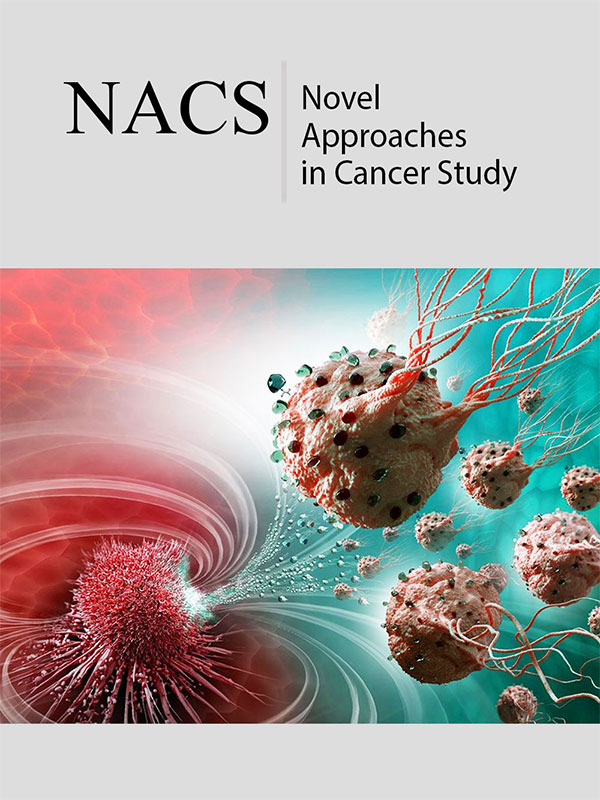- Submissions

Abstract
Novel Approaches in Cancer Study
Current Insights on the Prevalence, Clinical Diagnosis and Management of Pancreatic Cancer: A Comprehensive Review
-
Open or CloseMoses Adondua Abah1*, Nathan Rimamsanati Yohanna1, Esther Edesiri Ajoku2, Micheal Abimbola Oladosu3, Macdonald Uchenna Eke4, Naomi Ngozichukwuka Ajoniloju5,6, Njideka Obioma Nwanne4, Onyinye Ifeoma Ikedionwu7, Odusanya Kikunlore Elijah8, Jennifer Nnaemeka9 and Ekpenyong Utomobong Sunday10
1Department of Biochemistry, Faculty of Biosciences, Federal University Wukari, Nigeria
2Healthcare Management and Administration, University of New Orleans, USA
3Department of Biochemistry, Faculty of Basic Medical Sciences, University of Lagos, Nigeria
4Department of Medicine, College of Medicine, Imo State University, Nigeria
5Department of Pharmacology and Therapeutics, Faculty of Basic Clinical Sciences, Bowen University, Nigeria
6Department of Pharmacology and Therapeutics, Faculty of Basic Medical Sciences, University of Ibadan, Nigeria
7Department of Internal Medicine and Surgery, Faculty of Clinical Sciences, College of Medicine, University of Lagos, Nigeria
8Department of hematology and blood transfusion, Olabisi Onabanjo University Teaching hospital, Nigeria
9Department of Chemistry, Faculty of Arts and Sciences, Prairie View A&M University, USA
10Department of Internal Medicine, College of Medicine, University of Uyo Teaching Hospital, Nigeria
*Corresponding author:Moses Adondua Abah, Department of Biochemistry, Faculty of Biosciences, Federal University Wukari, Wukari, Taraba State, Nigeria
Submission: September 09, 2025;Published: November 13, 2025

ISSN:2637-773XVolume8 Issue 2
Abstract
Pancreatic cancer is a highly aggressive malignancy with a poor prognosis, accounting for a significant number of cancer-related deaths worldwide. Despite its rising incidence, the five-year relative survival rate remains low at 13%, with adenocarcinoma having a survival rate of just 8%. Early detection and effective management of pancreatic cancer are crucial to improving patient outcomes. Recent advancements in diagnostic technologies, including liquid biopsies, molecular imaging, and artificial intelligence-driven approaches, have shown promise in improving early detection rates. Liquid biopsies, in particular, offer a non-invasive means of detecting circulating cells, DNA and exosomes in bodily fluids. Meanwhile, advancements in genomic science have led to the development of targeted therapies, such as KRAS inhibitors, and immunotherapies, including checkpoint inhibitors and cancer vaccines. The management of pancreatic cancer requires a multidisciplinary approach, incorporating surgery, chemotherapy and radiation therapy. Novel therapeutic strategies, including precision medicine approaches and nanoparticle-based drug delivery systems, are being explored to enhance treatment efficacy. Clinical trials are ongoing to evaluate the safety and efficacy of these emerging treatments. This review aimed at providing current insights into the prevalence, clinical diagnosis, and management of pancreatic cancer. The complexities of pancreatic cancer diagnosis and treatment, emphasizing the need for continued research and clinical trials to improve patient outcomes were also discussed in this review.
Keywords:Pancreatic cancer; Clinical diagnosis; Targeted therapies; KRAS inhibitors; Precision medicine
 a Creative Commons Attribution 4.0 International License. Based on a work at www.crimsonpublishers.com.
Best viewed in
a Creative Commons Attribution 4.0 International License. Based on a work at www.crimsonpublishers.com.
Best viewed in 







.jpg)






























 Editorial Board Registrations
Editorial Board Registrations Submit your Article
Submit your Article Refer a Friend
Refer a Friend Advertise With Us
Advertise With Us
.jpg)






.jpg)














.bmp)
.jpg)
.png)
.jpg)










.jpg)






.png)

.png)



.png)






